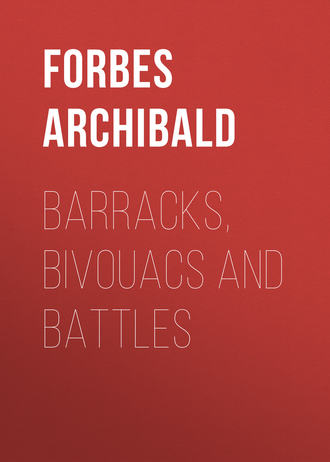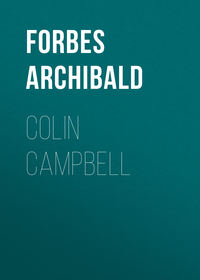 полная версия
полная версияBarracks, Bivouacs and Battles
In the course of the day of the fight at Ulundi, it had been intimated to the newspaper correspondents that if they desired to forward communications to Landmann’s Drift, their packets should be sent into headquarters to catch the outgoing courier the same evening. About 6 P.M. I carried my parcel to Lord Chelmsford’s headquarter in the laager. I found his lordship with Colonel North Crealock, his military secretary, seated at a table under an awning. I tendered my packet, when his lordship stated that he had altered his intention as to the despatch of Mr. Dawnay that evening, because of the absence of some details from Colonel Buller’s command. On hearing this I said, “Then, my lord, I shall start at once myself!” A few remarks having passed, I asked, addressing Lord Chelmsford, “Can I take anything down for you, sir?” Colonel Crealock, who had been writing hard during the brief interview, then struck in – “If you will wait five minutes, Forbes, till I have finished, I will give you this packet for Landmann’s Drift.” While I waited, Colonel Crealock, having finished writing, enclosed sundry papers in a large yellow “O.H.M.S.” envelope, addressed it to the “Telegraph-clerk in charge, Landmann’s Drift,” adding the endorsement “J. North Crealock, Military Secretary,” and handed the packet to me. This packet, entrusted to me by Lord Chelmsford’s military secretary in his lordship’s actual presence and sight, I duly conveyed to Landmann’s Drift, and handed it to the official in the telegraph-office there.
The reply from the War Office to this communication was as follows: —
Colonel Crealock corroborates that portion of your statement to the effect that you conveyed an envelope for him on the occasion alluded to from Ulundi to the telegraph office at Landmann’s Drift, but at the same time he emphatically denies that the envelope contained any document of a public nature, and moreover states that he explained to you that the Hon. Guy Dawnay had already been directed to take charge of the despatches when concluded. He also reports that the few words contained in the telegram to Mrs. Crealock which was enclosed in the envelope, were of such a nature as to preclude the possibility of the Director of Telegraphs supposing the message was despatched in the public service, and that he was subsequently charged with the cost of it.
Assuming that the contents of Colonel Crealock’s letter were of a private character, I was none the less for that journey an official courier. What was inside the envelope was immaterial; the outside was rigorously official. The F.O. bag carried by a Queen’s messenger is every whit as official when its contents are old lace and ball slippers as when they consist of despatches on whose terms hang peace or war. Again, I knew that Colonel Crealock’s alleged statement must be untrue that his enclosure consisted of a “few words” and no “document of a public character.” I had carried down nothing save his packet and my own written description of the battle. The telegraph official permitted me, as soon as I arrived, to despatch the few lines which reached Sir Garnet Wolseley and Sir Bartle Frere. He then was occupied for several hours in telegraphing the contents of Colonel Crealock’s envelope, which, as he explained, had precedence as being official matter; and it was not until after the “many hundred words” (those were his words) to which his matter extended had been sent off, that my descriptive message was put on the wires.
It is not easy to imagine that a man can honestly confuse between a short domestic telegram and a public message many hundred words long. Be this as it may, there was no difficulty in finding unchallengeable evidence of the untruthfulness of the statements attributed to Colonel Crealock in the above letter. At Aldershot I found the R.E. officer who had been in charge of the field telegraph office at Landmann’s Drift when I arrived there on July 5, and the operator who had despatched the contents of the official envelope of which I was the bearer from Ulundi. The records had been mutilated, so that documentary evidence was lacking; but the parole evidence of the officer and of the operator given in the former’s hearing and mine, was conclusive. I begged Lieutenant Jones to put into writing his recollection of the circumstances, and the following is his letter: —
I perfectly well remember seeing you arrive at Landmann’s Drift on the afternoon of July 5, 1879. You brought with you, to my certain recollection, a mass of written matter, of what description I cannot quite remember, but I am sure that, whatever it was, it took precedence of your own telegram to your paper, which proves that it was what we call “service messages” – that is, on military service. This the telegrapher at Landmann’s Drift also remembers well, as also the telegrapher at the transmitting station at Quagga’s Kraal. The entire bulk of the messages you brought amounted to nearly 4000 words, of which not more than 1200 were your own press message, which did not go till late in the night. I regret to say the abstract books are lost or destroyed, so that I cannot quote from that evidence. My memory, however, is so clear that I am quite certain to the extent I have mentioned.
(Signed) Francis G. Bond,Lieut. R.E.A copy of Mr. Bond’s communication I promptly forwarded to the War Office, making the following observations in the covering letter: —
1. I handed Mr. Bond no other matter than the official envelope I received from Colonel Crealock in Lord Chelmsford’s presence, and my own press message.
2. I knew nothing of the contents of the said official envelope, save that they were bulky. The envelope was endorsed “J. North Crealock, Military Secretary,” which, with the “O.H.M.S.,” gave it, I submit, an official character, and constituted the missive a despatch, and not a private communication, as Colonel Crealock alleges it to have been.
3. Colonel Crealock’s assertion that the envelope entrusted to me contained merely a telegram to his wife is utterly incompatible with the facts detailed in Mr. Bond’s letter, and confirmed by the personal testimony of the operators. Mr. Bond and they agree that the “service messages” handed in by me amounted to 2800 words, and that they had the official precedence which would not have been granted to a private telegram addressed by an officer to his wife.
4. I have never claimed to have carried the despatch describing the engagement. My standpoint is simply, as already set forth, that I carried a service despatch entrusted to me by Lord Chelmsford’s military secretary, in the presence, with the cognisance, and so with the tacit sanction of Lord Chelmsford himself. Apart from the word “Immediate,” which was written on the envelope, the inference is that this despatch, whatever it was, was of urgent importance, seeing that it was given to me setting out immediately, and not reserved for Mr. Dawnay’s later departure.
To this letter, which, along with its enclosure, may perhaps be regarded as of an inconvenient tenor, I have never received any reply whatsoever.
While waiting for what never came, it occurred to me to strengthen the case by asking the sapper of the R.E. telegraph train who had been the operator at Landmann’s Drift, to put into writing the verbal testimony he had given to his officer and myself. In reply to the letter in which this request was made, there came to me this interesting and pregnant communication: —
Mr. Forbes, – Your letter received. Don’t you think you’d better write to me again and state something more definite as to what you are prepared to “part” for the negotiation?
I’m willing to give you my recollections to as great an extent as you desire (between you and I), but you must cross the palm. – Yours,
Harry Howard.The man was utterly brazen. I wrote to him that if he chose to send me the statement I had asked for, I should accept his doing so as an evidence that he was ashamed of the letter just quoted, and would regard it as never written. “Should I not hear from you,” I continued, “I shall be forced to assume that you experience no shame for having written so base a letter, and it will be my duty to forward that letter to your commanding officer.” Howard’s reply came by return: —
Mr. Forbes, – You can button up your coat and take my letter round to the nearest General’s quarters.
The letter you desire you can have if you like. – Yours,
Harry Howard.He must have either been quite reckless, or what is known as a “barrack-room lawyer.” I let him be, as I was not sure that there is any military law under which he could have been punished. A comfortable man, Mr. Harry Howard, to be entrusted with the despatch of an all-important message at the critical moment of a campaign, while a spy who had “crossed the palm” was waiting round the corner!
It was presently disclosed that this correspondence on the official side was from the first simply what the Germans expressively call “a blow on the water.” It began with a foregone conclusion. An influential friend conversant with the circumstances wrote to the authorities representing with a certain vigour that he considered the treatment I had met with to have been ungracious and unfair. He was told in reply that, “As the Secretary of State for War considers that civilians who attach themselves to an army ought not be deemed eligible for war medals, the adverse decision with regard to Mr. Forbes must remain untouched.”
This is explicit, and therefore it would not have been in accordance with official tradition to have simply intimated the à priori resolution to me when I sent in my claim.
THE END

